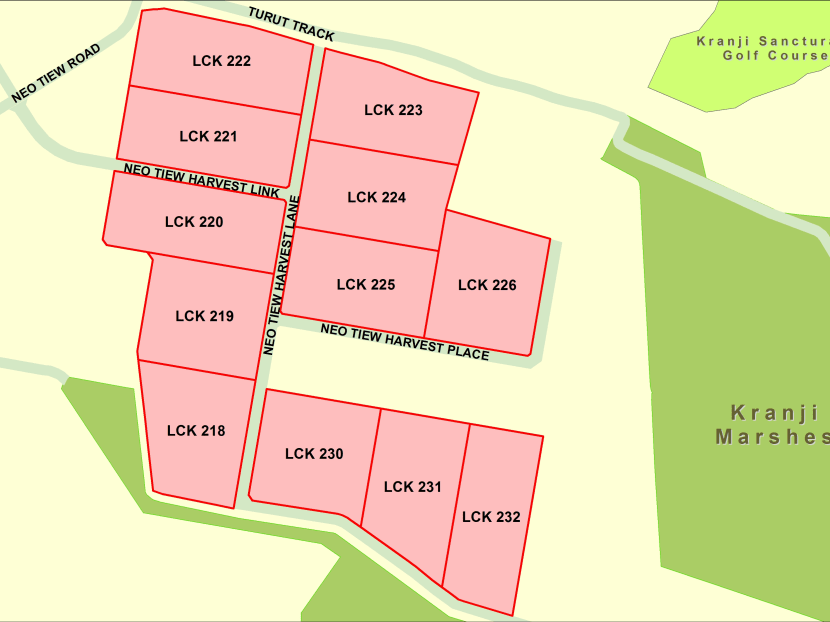Eight companies clinch 10 plots of land for vegetable farming
SINGAPORE — Eight companies, including two new entrants to the farming scene here, have clinched the first batch of land parcels offered by the Agri-Food and Veterinary Authority (AVA) through a fixed-price tender method.

A map from the Agri-Food and Veterinary Authority (AVA) shows the first batch of land parcels offered by the AVA through a fixed-price tender method.
SINGAPORE — Eight companies, including two new entrants to the farming scene here, have clinched the first batch of land parcels offered by the Agri-Food and Veterinary Authority (AVA) through a fixed-price tender method.
The AVA announced on Friday (Feb 9) that it had awarded 10 of the 12 vegetable-farming parcels in Lim Chu Kang that were launched for tender last August.
The exercise was the first time the AVA tendered out land with a fixed price upfront for interested parties to compete solely on the concept of their proposals.
Two of the 12 parcels were not awarded because there were “no suitable proposals”, and would be re-tendered in future to “provide further opportunities for productive and progressive farms”, an AVA spokesperson said.
The sites offered were about two hectares each and have 20-year leases. Prices started from S$273,000 and the tender drew 28 parties by the time it closed on Oct 26 last year.
Meod, which describes itself as a provider of “plug and play gardening solutions” on its website, clinched the most number of plots — three. The company already operates a one-hectare plot of farm at the D'Kranji Farm Resort.
The other companies clinched one parcel each.
Sunpower Grand Holdings was the only foreign firm among the eight successful tenderers. It is part of the Singapore-headquartered Sun Power Grand Holdings Group, a Taiwanese entity which manufactures opto-electronics products and has developed technology for growing hydroponic fruits and vegetables.
The successful companies incorporated productive and innovative farming systems, the AVA said. They included greenhouses with automation and smart controls, multi-tier hydroponic systems using LED lights and data analytics to optimise growing conditions, and multi-storey farms that use robotics and automated soil-less cultivation systems.
The companies were assessed on their production capability, production track record, relevant experience, and innovation and sustainability.
VERTICAL FARMING
One of the awardees, Vertivegies, intends to build nine six-storey modular structures, each measuring about 30m by 30m and resembling apartment buildings. Its founder and managing director Veera Sekaran, 55, said that vegetables would be grown on the top five stories, with the lowest storey housing pumps and control systems.
Mr Veera, who also founded an urban and vertical-greenery firm called Greenology, added that the new project would be his first large-scale commercial farming venture. Last year, he farmed vegetables using containers and discovered that each 40-foot container was able to yield about 5,000 heads of lettuce every three to four weeks.
Mr Veera, a botanist, expects to get Vertivegies’ first structure up within a year, and hopes to break even in three to five years. He plans to grow local tropical vegetables as well as “value-added varieties” such as butterhead lettuce and kale.
Without the fixed-price tender method, he said that it would be difficult to take part in the tender.
“One of the challenges in urban farming has always been land cost, especially in Singapore… It’s very difficult to grow vegetables when land prices are that high,” he said. “Getting awarded is definitely a very exciting thing. We were not expecting it (as) there were 28 tenderers.”
Mr Melvin Chow, AVA’s group director of food supply resilience, said that the winning proposals have the potential to optimise scarce land, reduce reliance on unskilled labour and bolster Singapore’s food security.
The companies are required to meet the production levels declared in their tender proposals, the authority said.
Last October, it launched the tender for the second tranche of land parcels for farm use. The three plots for farming of food fish drew five tenderers.
There will be more land tenders for vegetable farming in the second quarter of this year and from 2019 onwards.









